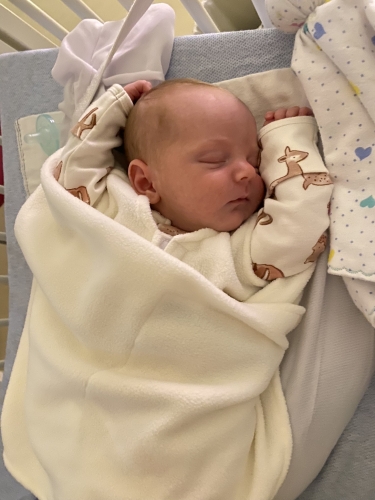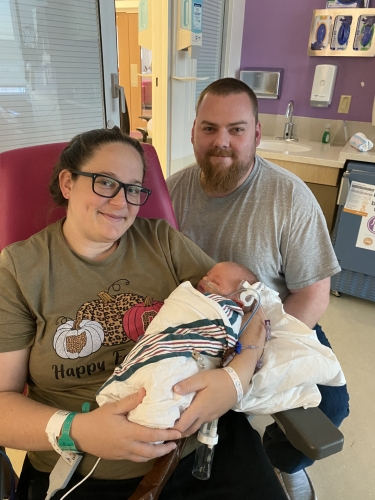Jan 15, 2024
patient story
Kali Haradon
emergency surgery for twisted intestine
patient name: Kali Haradon
age: 5 weeks
condition: Midgut volvulus
seen in: pediatric surgery, NICU
provider: Dr. Arturo Aranda
On a beautiful November day, time stood still for Courtney and Cody Haradon as they admired their beautiful baby girl, Kali. Everything seemed perfect! For the first twelve hours of Kali's life, no one would have known that this seemingly healthy baby would soon require emergency medical care.
spit up concerns
Courtney breastfed Kali from the moment she was born with no issues. But twelve hours after birth, Kali started to spit up. Courtney was concerned about the color because it resembled colostrum. Colostrum is the first breast milk produced by a mother. It is thick, sticky and can be yellow in color. Courtney immediately informed her nurse and continued to keep a worried watch over Kali. Five hours after the first incident, Kali began to produce more yellow spit-up. The nurses didn't seem too concerned at that point and told the Haradons to let them know if it happened again.
Soon enough, the yellow spit-up turned into bilious green vomit and Kali's care team immediately intervened by placing an NG tube, starting her on IV fluids and ordering an abdominal X-ray. When Kali's X-ray came back inconclusive, it was decided to transfer her to Dayton Children's Hospital for further testing.
emergency surgery at Dayton Children's
Courtney and Cody followed the Dayton Children's mobile intensive care transport team to the hospital. By the time they got to Kali in the neonatal intensive care unit (NICU) the pediatric surgery team was already consulting on her case and sent her for contrast imaging. During contrast imaging, a special dye is administered during an X-ray to give the radiologist the ability to evaluate the area in greater detail. The results of Kali's imaging showed that she had a condition called midgut volvulus and needed emergency surgery.
Dr. Arturo Aranda, division chief of pediatric surgery, was on-call the night of Kali's arrival. He explained to Courtney and Cody that midgut volvulus is a life-threatening condition in which the intestine becomes twisted, causing a blockage and ultimately causing the intestine to die. Dr. Aranda informed them that he planned to perform an emergency operation to correct the intestinal twisting, return the blood flow and prevent the life-threatening condition of a complete infarction of the intestine.
Three hours later, Dr. Aranda came out of the operating room to let Courtney and Cody know that Kali's surgery had been successful. Kali's intestines were completely dark purple when Dr. Aranda began operating. If surgery had been delayed any longer, her intestines would have started to die.
healing after surgery
Kali remained in the NICU at Dayton Children's for twelve days as her care team slowly reduced
her ventilator and pain medication dependency. For the first nine days of her NICU stay, Kali received her nutrition through IV administration, known as total parenteral nutrition (TPN). When the TPN was finally removed, Kali began eating on her own, slowly working her way up to an amount her care team was happy with.
The Haradon family followed up with Dr. Aranda in the pediatric surgery clinic two weeks after surgery. Dr. Aranda was pleased with Kali's progress and noted that her surgical incision was healing well. If the incision site doesn't develop a hernia and Kali doesn't develop symptoms that indicate another intestinal blockage, she wouldn't have to return to see Dr. Aranda for one year.
what mattered most to the Haradon family
Kali's rapid health decline raised concerns about her undergoing surgery. Her family questioned if she was strong enough to survive the procedure after all she had already been through.
Dr. Aranda's reassuring explanations before and after the surgery helped keep Courtney and Cody calm during their emotional journey. Despite many challenging days when it seemed like they weren't making any progress, Dr. Aranda was there for the family offering continued reassurance.
Because of the life-saving surgery performed by Dr. Aranda, Kali is expected to live a completely normal life, growing and thriving.




